Health + Medicine
Feature
Are You My Surrogate?
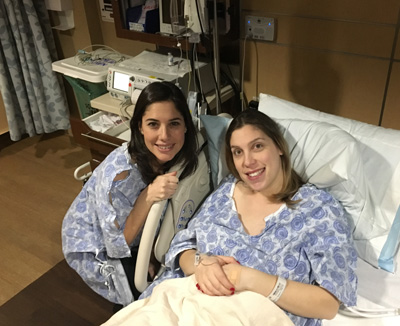
When Andrea Syrtash was struggling—and failing—to have a baby, her first cousin Elana Syrtash-Ochs offered to help by donating her eggs. “I was blown away by the offer,” recalled Syrtash, an author and relationship expert living in Brooklyn. “But at the time, I did not know if the problem was my body or my eggs.”
For a woman to carry a baby to term, she needs both a healthy reproductive system and a chromosomally normal embryo (egg plus sperm). After five years of failed infertility treatments and two miscarriages, Syrtash’s doctor determined that her eggs and her husband’s sperm were healthy but, he told her, “I think you’ll have a real chance of meeting your baby if we don’t use your body.” That’s when Syrtash began searching for a gestational carrier, often referred to as a surrogate, defined by the Centers for Disease Control and Prevention as “a woman bearing an unrelated child for another person or couple,” using an embryo from the intended parents.
Surrogacy represents only a small fraction of babies born through in vitro fertilization in the United States. In 2017, 3,678 infants—5 percent of IVF babies—were born through surrogacy, double the number since 2004, according to the American Society for Reproductive Medicine.
Some couples turn to surrogacy in a final effort to birth a genetic child after other methods have failed. For gay men and for women with uterine problems and other health issues, it is the only way to have a genetic child. Despite the increased use of surrogacy, it remains a complex process, usually expensive, lengthy and, for some Jews, fraught with religious constraints.
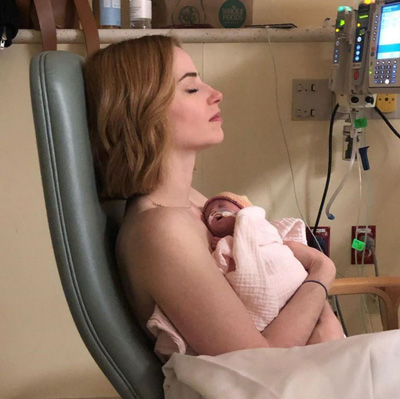
There are also legal issues. Commercial surrogacy, in which a surrogate is compensated for carrying a child, is banned in most European countries as well as in Canada and Australia. In the United States, there are no federal laws regulating surrogacy and, on the state level, laws vary widely. Compensated gestational surrogacy agreements are legal in most states except New York, Michigan and Louisiana. Attorney Melissa Brisman, founder of the surrogacy agency Reproductive Possibilities in New Jersey, who also runs a law practice exclusively for all aspects of reproductive law, said that surrogacy agreements, even when legal, are not enforceable in some states. Compassionate or altruistic surrogacy, conversely, is unpaid, and such agreements may not be enforceable either. (For a list of surrogacy-friendly states, go to surrogate.com.)
Since Syrtash, who founded the infertility website pregnantish.com, was born in Canada, where compassionate surrogacy is legal (and receiving payment is illegal), she tried working with two potential gestational carriers there. When those efforts fell through, she was devastated.
That’s when her younger, then-30-year-old cousin, Syrtash-Ochs, who already had two children with her husband, offered to be her gestational carrier. “I really believed a year of my life would give her a full lifetime of happiness,” Syrtash-Ochs said.
Syrtash recalled that her cousin also said she wanted “to grow our family,” which had suffered losses during the Holocaust. The cousins’ fathers are brothers. “In 1956, when my dad was 13 and Elana’s dad was 3, they escaped Budapest during the communist uprising. My dad literally carried Elana’s dad on his back when they escaped.”
Syrtash-Ochs, who runs two preschools in the modern Orthodox community in New Jersey where she lives, had received her rabbi’s approval. Still, she said, she learned that among her friends and neighbors, “I just can’t throw out the word ‘surrogate.’ They would stare at me blankly.” She had to explain to them about her cousin’s long struggle with infertility and that she was carrying their baby. “Then people would say, ‘That’s amazing.’ ”
Syrtash-Ochs was most concerned about the reaction of her oldest child, her 5-year-old daughter. She told her that “Andrea’s belly doesn’t work to carry a baby, so I’m growing it.”
Syrtash-Ochs—who is afraid of needles—had hormone shots to prepare her body for the embryo. Ten months later, in December 2018, she birthed her cousin’s long-awaited daughter, Arielle.
See related stories: Preserving Fertility After Cancer, The Blessings and Trauma of IVF, Learning to Live My Best Life, Without Children, Hadassah Advocates for Infertility Coverage and Members Share Their Struggles to Become Mothers
Despite her many difficulties, Syrtash was fortunate that she didn’t have the expense and logistical complications of hiring a surrogate, who often lives far away from the intended parents. In the United States, the process costs between $80,000 and $150,000. Of that, surrogates may receive an average of up to $60,000—not including health insurance and other expenses for unexpected complications, according to the West Coast Surrogacy agency. The remainder goes to paying agency fees and counseling services.
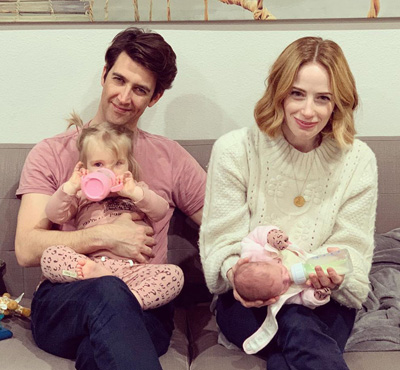
The frustration of failed pregnancies also was difficult for actress Jaime Ray Newman, currently filming the Hulu series Little Fires Everywhere and perhaps best known for her role as Kristina Cassadine on the soap opera General Hospital. The 41-year-old Hadassah member had a natural pregnancy with her husband, Israeli filmmaker Guy Nattiv, but gave birth to a stillborn baby at 40 weeks in 2013. Their next pregnancy, also natural, had to be terminated at four months due to complications. Newman then started IVF treatments, only to suffer another miscarriage. That’s when she gave up on trying to carry a child.
“I figured, we’re taking me out of the equation,” said the Detroit native who now lives in Los Angeles.
In 2018, the couple took a break from the effort to become parents to work on Nattiv’s short live-action film, Skin, about a neo-Nazi, and then started the surrogacy process. To their delight, their first baby, Alma Ness (ness is Hebrew for miracle), was born later in 2018. Skin won an Oscar in 2019.
“Even though she didn’t exit my body, I created this child,” said Newman. “She wouldn’t have existed if I wouldn’t have willed her onto the planet.”
In October 2019, their second daughter, Mila Nico, who was carried by a different surrogate, was born prematurely at 25 weeks. Weighing 1 pound, 9 ounces, she spent three months in the hospital before going home.
“Everyone goes through stuff. Trauma and tragedy are what join us as human beings,” Newman said.
“I know it made me a more empathetic person.”
For Rachel, who preferred not to give her last name, discovering she needed a surrogate was “bittersweet.” After she got married at age 45, she and her husband started infertility treatment at Hadassah Hospital in Jerusalem, where they live. Cancer was discovered during treatment, and she underwent a hysterectomy.
“My cancer was detected very, very early and it saved my life,” she said. A few years later, she was matched with a Jewish surrogate through an Israeli agency. That surrogate delivered Rachel and her husband’s first son when Rachel was 51; another carried their twins, a girl and a boy, when she was 54. (Read more about Hadassah Hospital’s Fertility Preservation Service here.)
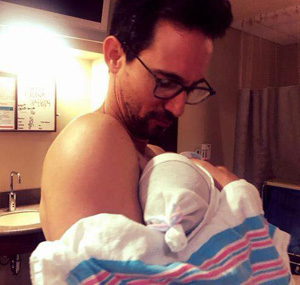
In Israel, there are fewer than 100 surrogacy births a year, and the cost is about $60,000 out-of-pocket. However, Israel’s national health insurance covers the additional expense of IVF treatments, at least for heterosexual couples and single women.
Gay men in Israel who want genetic children (using their sperm and a donor egg) frequently come to the United States. (In January, the Jewish Agency for Israel announced that it would help provide loans to help cover overseas surrogacy costs for its gay employees. Then, in February, Israel’s High Court of Justice struck down the actual law barring single and gay men from using surrogates, giving the Knesset one year to pass a new law.)
Previously, gay men had mostly relied on surrogates in India, Thailand and Nepal, which used to offer a less expensive option but now ban surrogacy for foreigners. Ivri Lider, 45, one of Israel’s top pop stars, worked with the Tel Aviv-based international surrogacy agency Tammuz Family, which helped find a surrogate for him as well as an egg donor. Lider, whose son, Albi, was born last October in Alabama, finds Israel’s restrictive laws “infuriating.”
Andrea Syrtash was fortunate not only financially but also religiously: Her daughter’s Jewishness is unquestioned because she was both created from her Jewish mother’s egg and carried by a Jewish woman.
Jewish law regarding surrogacy is complex. The Bible does not explicitly mention surrogacy, but matriarchs Rachel and Leah are recorded as having mothered the 12 tribes with Jacob, even though four of those children were birthed by their handmaidens, Bilhah and Zilpah, who were Jacob’s concubines.
The Bible is also silent about using a third-party to birth a child. But with the increased use of someone else’s sperm, eggs, embryos or womb, rabbis must grapple with the question, “Who passes along Jewish lineage?”
The Reform movement, which recognizes both matrilineal and patrilineal descent, accepts the egg donor as the mother rather than the woman who gives birth and ascribes Jewishness via the egg or sperm.
In contrast, Conservative Jewry says that whoever births the baby is considered the mother for the purpose of matrilineal descent. “Identifying a fetus by its genes alone might make the zygote an identified human being if only the gametes determine identity,” Rabbi Elliott Dorff, the chairman of the Rabbinical Assembly’s Committee on Jewish Law and Standards, said, referring to the embryo. “We do not want to endanger our stance on abortion.” In other words, if you call an embryo “Jewish,” you are giving rights and religion to the embryo and endangering the movement’s position supporting abortion rights.
Rabbi Mira Wasserman, director of the Center for Jewish Ethics and assistant professor of rabbinic literature at the Reconstructionist Rabbinical College, explained in an email that since Jewish identity for Reconstructionists can travel through any parental line, “we don’t emphasize the mother exclusively. We try to celebrate the broad variety of ways Jews build families today. While many Reconstructionists choose mikvah and other conversion rituals to affirm the Jewishness of the children they parent, others have moved away from biological determinations of parenthood altogether.”
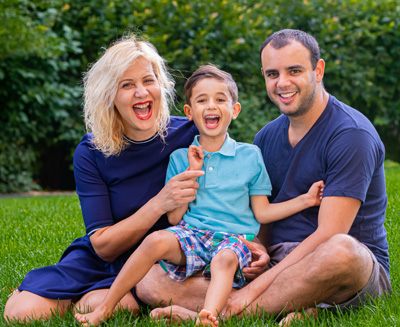
For Orthodox Jews, “there is no conclusive answer” whether Jewish lineage passes through the birth mother or the egg donor, said Rabbi Elan Segelman, the rabbinic adviser in America for Puah, an Israel-based organization that provides medical and halachic advice regarding fertility issues to Jews. But, he adds, most Orthodox authorities prefer that both the surrogate and the egg donor be Jewish. According to Puah, however, the Jewish surrogate must be unmarried or divorced, which adds another layer of complication since most surrogacy agencies prefer women who already birthed children.
Finding a single Jewish surrogate, said Brisman, the founder of Reproductive Possibilities, is like looking for “a needle in a haystack. If someone says they want one, I strongly discourage it.”
In most cases in America, a Jewish surrogate is unattainable. There is always, however, the option of conversion after birth. Still, some people are concerned about rabbinical rulings, which seem to be constantly moving the bar to Jewish identity for third-party reproduction.
Talia Kastiel-Katz, an Israeli-born American, owns one of the premiere Jewish egg donor agencies, The Chosen One, based in New York City. She herself had a child through surrogacy and was told when she began the process seven years ago, in the United States, that she did not need a Jewish surrogate; then she was told Orthodox rabbis could do a giyur lechumra, a conversion that’s “just in case,” following her son’s circumcision. She was then told her son had to wait until he was 3. Finally, Kastiel-Katz, who is not Orthodox but wanted her child to be considered Jewish by Orthodox standards, was informed that her child needed to have a Jewish education and to keep kosher in order for him to be considered Jewish. While Kastiel-Katz and her husband ultimately got the conversion certificate, she wasn’t willing to go through the same arduous, uncertain process for her second child.
“That’s why I decided to use a Jewish surrogate” for her second child, she said. As the head of an egg donor agency, she was offered the opportunity when “a surrogate called me and asked if she could help a Jewish family.”
Kastiel-Katz’s surrogate is just one example of the many caring women who choose to carry another woman’s baby. However, some people—such as feminist icon Gloria Steinem—believe that surrogacy takes advantage of underprivileged women.

But that’s “a misconception,” Brisman said, because agencies in the United States have a strict screening process for gestational surrogates and only a small fraction of the women who apply are chosen. These women have their own children, and while they are compensated for their time and labor, most are also motivated by wanting to help another woman.
Many parents keep in touch with the women who carried their children. Some are so moved that they want to pay the mitzvah forward.
“Somebody did a really selfless act for me, twice, carrying a child,” said Dr. Georges Sylvestre, an obstetrician-gynecologist practicing in New York City who has two sons, 9 and 6, with his husband, David Margolis. (Each is the biological father of one child.) As Reform Jews, they were not concerned with finding Jewish surrogates or egg donors.
“Since surrogacy, I’ve always had it in the back of my mind that I wanted to give something back,” Dr. Sylvestre said. Last summer, he donated a kidney to an anonymous recipient and was back to work within a few weeks. “There are 7,000 people currently waiting for a kidney. It doesn’t take much away from me, and it will really change lives the way our surrogates did. I think I really made a difference in someone’s life.”
Amy Klein is the author of The Trying Game: Get Through Fertility Treatment and Get Pregnant Without Losing Your Mind (Ballantine Books/Random House), which will be published in April.
INFERTILITY RESOURCES
These Jewish organizations help with infertility information, support and, sometimes, financing.
ATime offers rabbinical guidance, medical referrals, observation of the IVF procedure in labs and adoption support for religiously observant couples.
Bonei Olam provides millions of dollars annually in funding for research and infertility treatment—though not for third-party reproduction such as surrogacy—as well as rabbinical guidance.
GoStork is a marketplace where intended parents can find, compare and connect with IVF clinics, surrogacy and adoption agencies, and egg/sperm donors from various donation agencies across the United States.
Hadassah is launching a new initiative to help destigmatize infertility and promote infertility-related legislation on the state and national levels.
Hasidah helps connect Jewish couples to infertility resources and also provides financial grants to pay for treatments.
I Was Supposed to Have a Baby is a social media community for those struggling with infertility.
Pregnancy Loss Support Program at the National Council of Jewish Women in New York offers interfaith, peer-supported telephone counseling nationwide and in-person support groups in New York City for families coping with miscarriage, stillbirth, newborn death or termination for fetal anomalies as well as for women who are pregnant following a loss. For men and women.
Puah is an Israel-based, international organization that provides halachic guidance, information on fertility preservation and counseling to couples struggling with infertility as well as IVF supervision to prevent error during the procedure.
The Jewish Fertility Foundation provides financial assistance, educational awareness and emotional support to Jewish families in Atlanta and Cincinnati who have medical fertility challenges.
Uprooted: A Jewish Communal Response to Fertility Journeys is a pluralistic Jewish community that seeks to educate, raise awareness and provide support for individuals experiencing infertility through healing journeys and rituals.
Yesh Tikva helps potential parents navigate infertility, and raises awareness and sensitivity about the issue throughout the Jewish community.
The Online Hadassah Magazine Discussion Group presents “Struggling With Infertility,” an exclusive live web interview with Amy Klein, author of The Trying Game: Get Through Fertility Treatment and Get Pregnant Without Losing Your Mind, moderated by Lisa Hostein, executive editor of Hadassah Magazine. Register here and receive a link to watch the interview on your computer or mobile phone.









 Facebook
Facebook Instagram
Instagram Twitter
Twitter
[…] Week (April 19-25). The New York Times“Fertility Diary” columnist and author Amy Klein will serve as the initiative ambassador. The initiative will raise awareness, destigmatize and […]